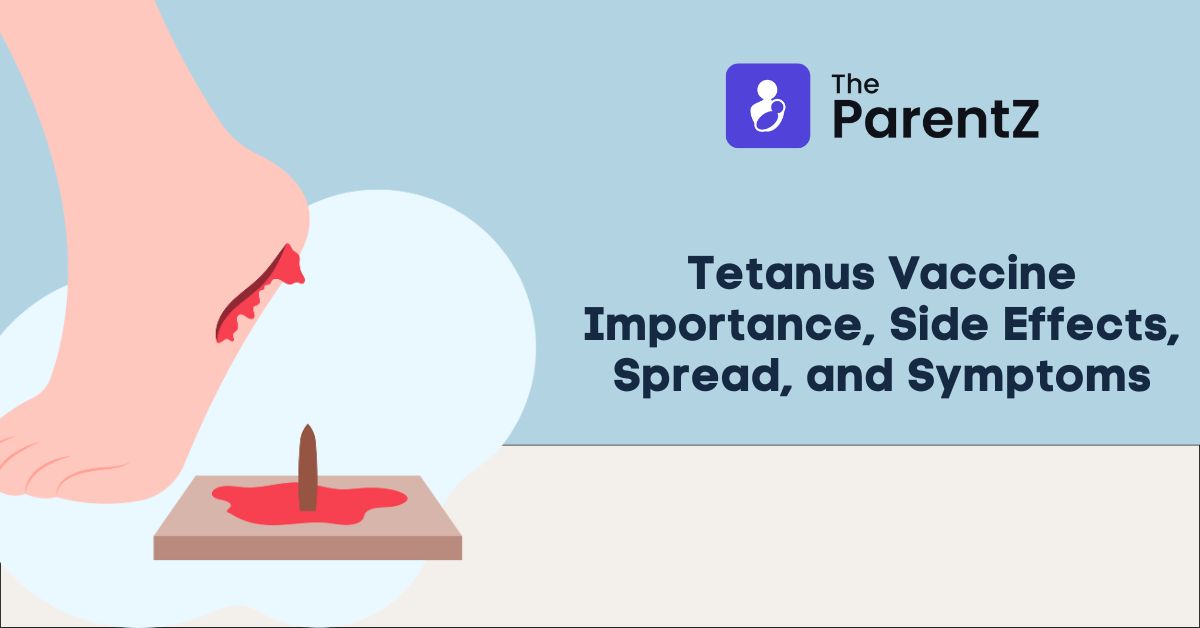When to give the vaccine?
Tetanus vaccine is available in two preparations – combined vaccines as DPT ( Diphtheria-Pertussis-Tetanus ) and as monovalent vaccine which is purified and adsorbed tetanus vaccine. Tetanus vaccination is included in the national immunisation schedule. According to NIS,the DPT form is given in three doses at 6, 10 and 14 weeks of age to the child. After 3 doses, two boosters are given at 16-24 months and 5-6 years. After the booster doses are also completed, tetanus is given as a standalone booster at 10 years and 16 years of age.
Why should the shot be given?
Giving a tetanus vaccine to your child is extremely important. Tetanus bacteria is widespread through the environment and can be introduced into the body of your child through seemingly innocent scratches as well. There is no definitive treatment for tetanus and it is a life threatening condition. Immunisation by vaccination is the only definite way to prevent infection of tetanus in your child. Vaccination against tetanus leads to development of protective antitoxins in the body.
What are the side effects?
There are a few side effects which may develop after giving a tetanus shot to your child but it must be kept in mind that the disease tetanus is much worse and severe as compared to the side effects which may develop. The side effects which develop include:
- Local reactions may develop. This includes pain, swelling and redness in the area where the vaccine was injected. This is not a cause for concern and it will resolve spontaneously over the next few days.
- Fever may develop post vaccination. Fever can be treated at home itself with antipyretics such as paracetamol being given. The thing to consider during giving your young child medicine is that the dose should be correct according to the age and weight of the child and overdosage has to be avoided.
- Anaphylaxis or an allergic reaction to the vaccine may occur. Allergic reaction is more common with the adsorbed tetanus vaccine than combination. It can be recognised early by reddening of skin and generalised itching followed by difficulty breathing. A child who develops anaphylaxis should be brought to the hospital immediately. It can be managed by giving a shot of anti-allergic and anti-inflammatory agents immediately.
- Brachial neuritis may develop after a tetanus shot. It means that the nerves of the arms or shoulder are affected and become dysfunctional without involving the nervous system at large. There may be pain and weakness in one or both arms. Only pain relievers are given as a treatment for this.
What is tetanus?
Tetanus is a life threatening disease which affects the neuronal system of the body. The causative agent of tetanus is a bacterium, Clostridium tetani and the endotoxins produced are responsible for clinical features of tetanus. Characteristic features of tetanus are muscular rigidity interspersed with painful spasms of the body.
What are symptoms of Tetanus?
Symptoms of tetanus can manifest either immediately after an injury and infection or may also appear after months. The symptoms of tetanus appear in a sequence which is:
- Tetanus is characterised by painful muscle spasms of the body. These spasms start at the jaw and gradually progress downwards.
- A child infected with tetanus first develops muscle spasms around the jaw and the jaw becomes stiff and immovable.
- There is development of tension in the muscles around lips. It produces a constant grin-like expression.
- The neck muscles then become stiff and painful.
- There is difficulty in swallowing.
- Abdominal muscles also become rigid.
- As the disease progresses, there is the presence of painful, seizure-like spasms that last for several minutes.
- Muscles in the neck and back of the child arch, the legs become rigid, the arms are drawn up to the body, and the fists are clenched. This is the characteristic posture of a child who has a tetanus infection.
- The spasms can be triggered by any event, even minor ones which stimulate the senses like sudden sound, a physical touch or light.
- As the disease progresses, there are wide fluctuations in the range of blood pressure from high to low.
- The heart rate becomes elevated.
- The child can also develop fever and extreme sweating.
Is tetanus serious?
Tetanus is a very serious life threatening disease. It has a very high mortality if a non-immune person is infected. There is no definitive treatment for the disease and treatment focuses only on management of the symptoms and complications. The course of the disease is extremely painful as well. Tetanus is also extremely dangerous as it can manifest after a long time of injury since the spores can remain dormant in the body for a while.
How does Tetanus spread?
Tetanus spreads when the spores of Clostridium tetani bacteria are introduced into the body. It is usually by the contamination of wounds by tetanus spores. These spores produce the endotoxin responsible for production of the clinical symptoms of tetanus disease. The spores can be introduced into the body when they come in contact with broken skin. A range of injuries and accidents can lead to tetanus. These include simple injuries from a pin prick and abrasions to burns, animal bites and stings, unsterile medical procedures to major road accidents.





Be the first one to comment on this story.